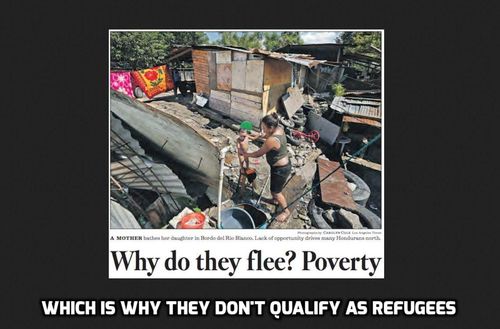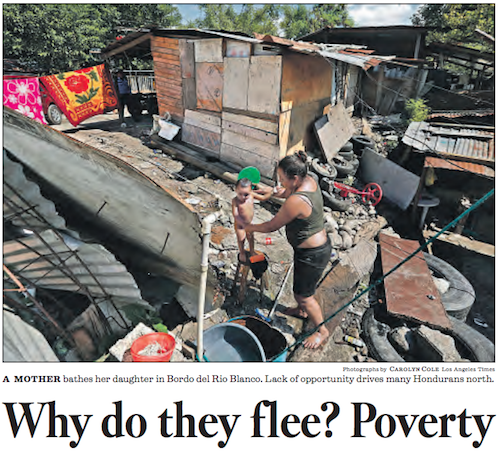
12/19/2018
According to the Los Angeles Times article referenced below, the reason for the current invasion of caravan pests was due in part to Washington’s successful effort to reduce Honduras’ violent crime. If accurate, the claim is another stake in the heart of foreign aid, when “hundreds of millions of dollars” were sent by Washington to the one of the most backward and violent nations of the Western Hemisphere: but the article argues that crime reduction resulted in a greater desire on the part of residents to leave, sort of. Or maybe, with the crime diminished, Hondurans noticed that everything else was still rotten — mass unemployment, political instability and corruption everywhere.
What’s chilling is the way Hondurans refer to caravan behavior as the “exodus” — as in a mass departure. If there’s one thing America doesn’t need, it’s a large chunk of the more than nine million Hondurans.
Honduras is dirt poor, period, that’s why people leave. But poverty does not entitle foreigners to asylum. If it did, then three billion people could move in.

The crime reduction theory is interesting, but more likely is the work of leftist political activists to incite Hondurans to illegal immigration. Breitbart reported that caravan organizers, Pueblos Sin Fronteras (People without Borders in English), guaranteed easy asylum as a way to get thousands of Hondurans on the road north.
And the pitch worked — there’s nothing like the promise of lots of free stuff in America to inspire Third Worlders to head for the border.
The article does contain interesting facts about Washington foreign policy toward the Third World, including idiotic spending.
Homicides have fallen dramatically in Honduras. So why are people still fleeing?, Los Angeles Times, December 14, 2018
Less than a decade ago, when Honduras was the homicide capital of the world and this industrial city was the homicide capital of Honduras, the neighborhood of Rivera Hernandez was usually deserted after dark. Residents cowered in their homes, hiding from murderous gangs.
Today, there is less to fear. On a recent warm evening, teenagers kicked around a soccer ball as a vendor selling yam chips circled with a pushcart and a high school marching band practiced nearby.
The transformation is thanks in part to hundreds of millions of dollars the United States has spent to help Honduras fight crime.
The aid has flowed based on a simple hope: If the streets were safer, fewer people would migrate north.
But the reality has proved much more complicated. Though the country’s homicide rate has fallen dramatically, the number of people fleeing Honduras in recent years has not — a fact on display this fall when thousands of people joined so-called migrant caravans and began trekking north.
The reasons for “the exodus,” as many in Honduras have begun referring to the recent mass migration, go far beyond violence. The economy is a shambles, with nearly two-thirds of the labor force either unemployed or underemployed. Endemic corruption and political instability have also been major factors.
“We’re seeing an accumulation of crisis upon crisis upon crisis,” said Lester Ramirez, director of investigations at the Assn. for a More Just Society, a nonprofit that has received U.S. aid for its anti-violence work. “A lot of people have just lost hope.”
Among Hondurans deported from the U.S. in 2016, 96% cited economic hardship as a main reason for migrating, according to the Pew Research Center.
A 2018 poll by a Honduran think tank, the Reflection, Research and Communication Team, found that among those who had a family member leave in the last four years, 83% said the reason was economic insecurity, compared with 11% who said it was violence.
“The caravan has exposed the reality of poverty, unemployment and repression,” said Honduran economist Hugo Noe.
The best available measure of illegal immigration to the United States is how many people are caught at the border, and from fiscal year 2011 to 2014, the number of Hondurans who were detained by the U.S. Border Patrol each year increased from 11,270 to 90,968. Many were children traveling on their own who said they were fleeing gangs.
In response, the U.S. government dramatically increased aid to Honduras as well as to Guatemala and El Salvador, which were also sending large numbers of migrants, appropriating $2.1 billion since fiscal 2016, according to the Congressional Research Service.
The largest share has gone to crime fighting. In 2016 and 2017, Honduras received nearly $204 million for violence prevention, anti-drug efforts, improvements to the justice sector and other security measures, according to the Washington Office on Latin America think tank. [ … ]
The White House requested $66 million for Honduras in its 2019 budget. This fall, Trump threatened to cut aid to the region all together if Honduras, El Salvador and Guatemala did not stop migrant caravans from traveling north.
This is a content archive of VDARE.com, which Letitia James forced off of the Internet using lawfare.